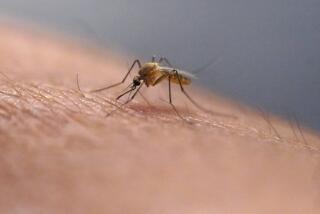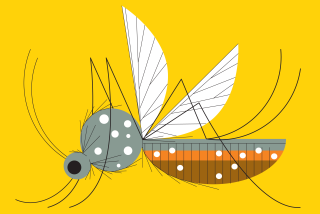Don’t like DEET repellents? Now you have other choices
THE Centers for Disease Control and Prevention in spring expanded its list of approved insect repellents, giving travelers more choices in the battle against disease-carrying mosquitoes.
Besides repellents with a DEET base, the CDC has approved those with the chemical picaridin as its main ingredient and those with oil of lemon eucalyptus, which is considered a more natural alternative.
The new guidelines are just in time for mosquito season. As of the Travel section’s deadline Tuesday, 11 states including California had reported 13 human cases of the potentially fatal West Nile virus, spread by infected mosquitoes, including one fatality. Mosquitoes also transmit malaria and dengue fever.
In humans, West Nile symptoms can range from none to moderate, with headache, fever and nausea. About one in 150 develops high fever, tremors and coma, the CDC reports.
In a recent study that was included in the CDC review of repellents, researchers found that a repellent with 15% DEET gave about 7.2 hours of protection against three mosquito species, all found in the U.S. Oil of lemon eucalyptus at a 26% concentration gave 7.6 hours of protection; a repellent with 10% picaridin gave 7.2 hours, said Emily Zielinski-Gutierrez, a CDC behavioral scientist involved in the review. (Picaridin repellents sold in the U.S. have a 7% concentration; higher concentrations are available in other countries.)
If you are going to areas where malaria is prevalent, “There is insufficient evidence that oil of lemon eucalyptus up to 30% can protect against malaria-transmitting mosquitoes,” Zielinski-Gutierrez said.
Picaridin works much like DEET, said Jack Morris, a research biologist at Spectrum Brands in St. Louis, which sells all three types of repellents.
Mosquitoes home in on the lactic acid given off by the body, he said, and DEET and picaridin block the lactic acid receptors in a mosquito’s antennae.
Oil of lemon eucalyptus repels mosquitoes as it evaporates from the skin, Morris said.
How do picaridin- and oil of eucalyptus repellents stack up against those with DEET? To find out, I enlisted four hikers in a purely unscientific study conducted on recent Sierra Club hikes in Griffith Park.
They compared DEET with 25% concentration (Off! Deep Woods) with picaridin of 7% concentration (Cutter Advanced) and oil of lemon eucalyptus at 30% concentration (Repel).
No one reported any bites. (Nor did I hear hikers who went without repellent complain of bites.) Aesthetically, oil of lemon eucalyptus was preferred over DEET by three out of four hikers who sprayed Off! on one arm and Repel on the other.
“[Eucalyptus oil] clears the sinuses as well as repelling bugs,” Rebekah Davidson said.
“And it seems less toxic, than the DEET, James Synnestvedt said.
But a third hiker, Myriam Sababa, was not as pleased. “The eucalyptus smells worse than the DEET,” she said.
Picaridin was preferred over DEET by the three hikers who compared those two. Picaridin “smells more masculine too,” James Stevens said.
Whatever your repellent of choice, experts say it’s important to reapply as instructed.
If you are going to be out for a couple of hours in your backyard, said Zielinski-Gutierrez, either of the newly approved repellents or a low-concentration DEET repellent is probably fine. “But if you are going to be out all day, if you are going to be in an area just thick with mosquitoes, you probably want one of the higher-concentration DEET products.”
*
Healthy Traveler appears every other week. Kathleen Doheny can be reached at [email protected].
More to Read
Sign up for The Wild
We’ll help you find the best places to hike, bike and run, as well as the perfect silent spots for meditation and yoga.
You may occasionally receive promotional content from the Los Angeles Times.





